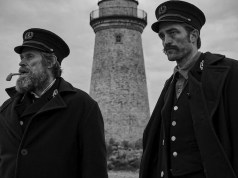We get to know early-20th-century oilman Daniel Plainview pretty well over the course of “There Will Be Blood’s” 2 1/2 hour running time, and there’s no question that blood is important to him, in both its literal and metaphorical senses. He’s willing to shed it when necessary (i.e., when it suits him), and he puts a lot of stock in the blood shared between family members. “If it’s in me, it’s in you,” he says to his brother of a character trait he has, one that there’s no reason to assume would be genetic. Plainview’s son is adopted — which to Plainview means he might as well be some stranger off the street.
But in Paul Thomas Anderson’s sprawling, engrossing, multi-layered adaptation of Upton Sinclair’s “Oil!,” Daniel Plainview (played with characteristic intricacy by Daniel Day-Lewis) is most obsessed with a different kind of blood, the black, viscous kind that runs through the veins of the Earth and gives life to civilization. When you control that blood, you control the world.
Plainview seems to know this instinctively. In the film’s dialogue-free first 15 minutes, we see him as a grizzled miner in 1898, then building his first well in 1902, and ultimately in 1911, where he’s a successful businessman. He goes from one California town to another and leases property where he believes oil can be found. True to his name, he speaks plainly and openly to those he does business with. What most of them don’t know, unfortunately, is that he’s a snake. He lies with breathtaking ease, as if it’s just as easy to formulate a complicated falsehood as it is to simply tell the truth. For him, it probably is.
Tipped off by a wayward son of the Sunday family, Plainview and his little boy, H.W. (Dillon Freasier), descend on the small town of Little Boston. The Sundays have a large, barren ranch with oil underneath it, and Plainview promises that as he mines it and builds a pipeline, he’ll also build schools and churches and bring roads and water wells to the town. It’s in everyone’s best interest that he essentially buy up every piece of property in sight. Sure, they could drill for the oil themselves, now that they know it’s there — if they had the equipment and the know-how and the men to do it. Plainview has all that. They need him.
Plainview is not a religious man (except when it benefits him to pretend to be), which puts him at odds with most of the town, particularly Eli Sunday (Paul Dano), a spiritual teenager who makes his father promise not to lease their land until Plainview pledges to give $5,000 toward the construction of a church for Eli to preach in.
Eli is widely viewed as a healer and a prophet, earnestly plying his spiritual gifts. He is a natural enemy to Plainview, who believes everyone is as big a charlatan as he is himself, and who furthermore doesn’t want anyone else in town to wield power or influence. “I want no one else to succeed,” he says with a laugh to one of his associates. “I hate most people.”
An accident at one of the wells leaves young H.W. nearly deaf, which makes him even less useful to Plainview. (Did Plainview ever even give the poor kid a name, or just initials?) Plainview has generally been compassionate to his adopted son, if not what you’d call “loving,” but he’s too busy to be burdened with a deaf kid — especially one who’s not even his real son, for crying out loud. He is furious when Mr. Sunday (David Willis) dares to suggest how he should raise his family, though it’s worth noting that he did the exact same thing to Sunday when he first came to town.
Comparisons to “Citizen Kane” are inevitable, for reasons on the screen and behind it. On the screen, we have a story of a flawed, wealthy man who rises to great power and lets it destroy him. Behind it, Paul Thomas Anderson, like Orson Welles, is a wunderkind, revered by peers twice his age. He understands the technical elements of filmmaking as well as the storytelling elements. He was Robert Altman’s right-hand man, and widely believed to have been at least a co-director on his final film, “A Prairie Home Companion.” Anderson may well become one of the greatest filmmakers of the 21st century — if he doesn’t follow Welles’ path and flame out early, that is.
Paul Dano, who barely spoke as the Nietzsche-emulating teen in “Little Miss Sunshine,” more than makes up for it as the verbose, fire-and-brimstone Eli Sunday. Eli’s sincerity and godliness are apparent — I take him at face value, though I note that other viewers find him duplicitous and egotistical — but they don’t prevent him from standing up to Plainview … and that means Dano is standing up to Day-Lewis. It’s a testament to Dano’s strength that the battle isn’t as one-sided as you’d expect. (The two also appeared together in the little-seen “Ballad of Jack and Rose.”)
Day-Lewis is well known for his selectivity when it comes to making films, and for his deep commitment to the few roles he does choose. He is not often known for being a lot of fun to watch, though. His characters tend to be nearly as serious as he is. So it’s a refreshing change to see him get wild and woolly as Plainview, whose fearsomeness and villainy are electrifying. It doesn’t matter that the film is 158 minutes long. I could watch Daniel Plainview rant, scheme, lie, and connive for hours.
A- (2 hrs., 38 min.; )





